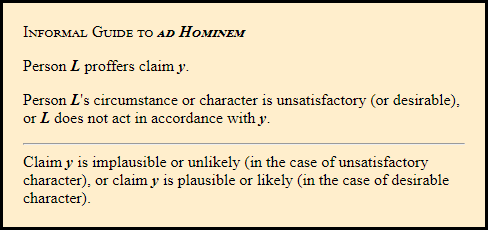I haven’t written a ‘dealing with’ article in quite some time and this rather different from my other ones in that it is a bit more pedantic. This is an article about argumentation and problems I have observed when involved in it. If that doesn’t sound like it is for you check out another article on my blog. On to the meat and potatoes!
Some Basics…
I often find that people use the word fallacy incorrectly (I already started off with a pretentious sentence, oh well, this will be embarrassing if I am wrong). Fallacies in logic are concerned with validity and not truth. Validity is essentially what follows from what and is the whole business of logic. Contrary to popular belief, logicians don’t care about truth but soundness. Soundness is what makes an argument logical. Take these two arguments:
- Socrates is a man, all men are mortal therefore Socrates is mortal.
- Socrates is a sheep, all sheep are immortal therefore Socrates is immortal.
Socrates is obviously not a sheep (according to most people and depending on what you mean) and we would also agree that all sheep are not immortal, yet this is a logical argument. If it were the case that Socrates was a sheep and if all sheep were immortal (which would mean people would be eating a lot of mutton) then it must follow that Socrates would be immortal. Unsound logic is the very definition of fallacious, but what is unsound logic? Here again are two examples:
- Sharks are mammals, and space is green therefore the sky is usually red.
- Birds can fly, and pencils can be used for writing, therefore, I am writing an article about logic.
The first argument is neither true nor valid. Nothing in the first follows, there is no reason why sharks being mammals (even if they were mammals) and space being green (even if it was) would mean that the sky would usually be red. As for the second, even though everything stated in that sentence was true there is no reason that such things would mean me writing an article about logic. So both are not sound arguments. The fallacy fallacy is a common fallacy that people use when they think that an unsound argument means a false argument. We have just demonstrated that this is not true and that even if no evidence is given, it doesn’t mean that what you are saying is false. It doesn’t mean that your conclusion is false!
The Real Meat and Potatoes
I find that people misuse the word fallacy in arguments all the time. So I wrote to clear these things up. The misused fallacies I am talking about are: ARGUMENTUM AD POPULUM (appeal to popularity or consensus), ARGUMENTUM AD VERECUNDIAM (appeal to authority), and ARGUMENTUM AD HOMINEM (appeal to character or argument from character). These are all informal fallacies, as opposed to formal fallacies. Formal fallacies are focused on the actual form of the argument, while informal fallacy is focused on the content. The content has to be logically unconvincing so that it doesn’t follow to believe what you are saying is true. The fallacies I offered above have severe content errors when people are actually caught making them. However, in conversation, many statements that insinuate these fallacies are not actually doing so. Somebody usually accused of using these fallacies is almost always using a shorthand for a claim that makes far more sense and unless explicitly stated as a fallacy, one should not believe another’s argument is fallacious.
ARGUMENTUM AD POPULUM
When someone appeals to consensus (imagine the sentence “well most scientists agree that…”) in an argument it isn’t actually enough to make the argument fallacious. There are two major cases that make an appeal to consensus reasonable and only one case when it is fallacious. The one case that an appeal to consensus is fallacious is when you say that a person is wrong because most scientists agree and you aren’t talking about the consensus of scientists. If the argument is about the consensus of then it makes reasonable sense to say that you are wrong because that isn’t the consensus. Otherwise, how could you possibly refute a claim on consensus?
The other case is when you use that fact of consensus as supporting evidence or evidence to your claim. Which is also reasonable. People will say that this evidence but they usually conflate evidence with truth or certainty. The evidence is merely a reason to believe something is the case; The available body of facts or information indicating whether a belief or proposition is true or valid. And consensus indicates whether a belief is true or valid.
If you are not convinced, I ask why a person would ever ask someone else to confirm whether something happened or not, like a UFO. Or why we vote, or why a jury of many people is preferred over just one. There is a reason to believe that the more people believe something is the case, the more likely that belief is correct.
ARGUMENTUM AD HOMINEM
People make so many mistakes when it comes to this fallacy that it is now merely a smart way to say insult. First of all, most insults are never even meant to address someone’s argument or viewpoint. Simple insults like “You’re an idiot,” are completely separate from the discussion a way to vent, are statements of fact, or claims on their own two feet: “Wow, you are so stupid if you believe X is true,” or “You’re a racist so your opinion doesn’t matter,” are such cases. This fallacy is rarely ever actually used and you are usually not identifying it when you claim that something is an ad hominem fallacy.
I think this confusion comes from the google definition (taken from Wikipedia):
A fallacious argumentative strategy whereby genuine discussion of the topic at hand is avoided by instead attacking the character, motive, or other attribute of the person making the argument.
This is not an actual fallacy. I repeat the thing in this box is not actually a fallacy or fallacious in absolutely anyway. Fallacies happen only when you attempt to address the argument and do so in a way in which your reasoning doesn’t follow. An ad hominem must be in the form of “You are wrong/false/invalid because of X character trait” and this is a fallacy if and only if your character is not a part of the argument. If your character forms the basis of the argument that the Ad Hominem is meant to address then it is valid. All court cases are essentially arguments based on the character of the person. If basing arguments on a person’s character was in all cases wrong, how would anyone run any court system? “Marx’s arguments for communism are wrong because he was a rich Jewish capitalist,” is an example of the ad hominem fallacy.

Again, you have to at least address claim y and the Wikipedia definition doesn’t include that important information.
ARGUMENTUM AD VERECUNDIAM
According to my observation, the actual instances in which people make this argument in a fallacious manner are again rare. The reason is that it usually easy to spot when someone is truly applying the fallacy. “I am the king of England, therefore, you should all go to war with France,” is such an example. Nothing about being the King of England provides any reason within the content offered to go to war with France. A properly made and valid form of the argumentum exists when the authority and expertise are relevant to the discussion at hand. If someone told you that Einstein believed that Newton’s theory of gravity was flawed and therefore you should believe that because he is an expert in theories of gravity, it is perfectly reasonable. His expertise is relevant to the argument that Newton’s theory of gravity is flawed. This is not a fallacious case.

Conclusion
People say this or that is a fallacy usually to reduce it to the absurd so that they don’t actually have to create counter-arguments. Be careful of this.
Sources: http://philosophy.lander.edu/logic/authority.html http://philosophy.lander.edu/logic/person.html https://en.wikipedia.org/wiki/Fallacy A Very Short Introduction to Logic by Graham Priest


Nicely done! For some reason your posts haven’t been showing up in my inbox so I’m just catching up on them.
LikeLiked by 1 person
i should have responded a while before today but i had some serious stuff come up in life. I wrote another piece this time on world peace. I hope you will read it! Also I am tryin to find a schedule to follow. Every Sunday their should be a new post.
LikeLike
No worries:-) I read the world peace article and liked it. There seems to be a glitch with wordpress and notifications. But you can always email me directly at: dukethecat32@gmail.com
LikeLike
great!
LikeLike